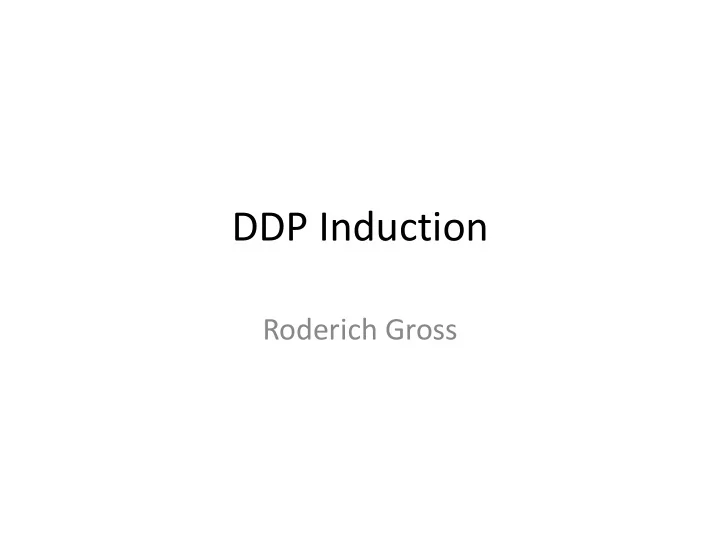

DDP Induction Roderich Gross
Welcome to Centre of Doctoral Training (CDT)
CDT schedule • Month 1: Induction, training needs analysis • Months 6-9: Critical appraisal of a paper • Month 10: Confirmation review report (draft) to supervisory team • Month 12: Confirmation review report (final) to department • Month 13: Confirmation review meeting • Month 18: PGR Symposium • Month 24: Present a paper (supervisor team) • Month 30: Oral presentation (supervisory team) • Month 36: Submission of dissertation • (Month 48: Hard submission deadline)
Leave of Absence (LOA) • Authorised absences for following grounds – Medical – Personal – Maternity/paternity – Academic – Financial* • LOA form submitted to department • Students on a Tier4 visa, must contact International Student Support & complete “LOA self-help tool”
DDP (compulsory elements) • Faculty Professional Behaviour and Ethical Conduct (FCE6100)* • http://shef.ac.uk/egs/ethics * Faculty requirement for passing the confirmation review.
DDP (compulsory elements) • Attend all departmental seminars (Wednesdays 2pm unless notified) – Confirmation review: 100% attendance should be your target (any student with a below 66% level of attendance will not be eligible to pass) • Student-led seminar (Mondays 2pm)
DDP (compulsory elements) • Departmental Research Symposium – Year 1: Attend – Year 2: Present poster – Year 3: (Not compulsory) Give oral presentation
DDP (compulsory elements) • Critical Appraisal Exercise – Presentation to supervisory team of a critical appraisal of an important paper by the end of month 9 – Paper identified by your supervisory team to you by the end of month 6
DDP (compulsory elements) • Departmental Research Training sessions (Semester 1) – DDP Skills – Presentation Skills – Technical Communication* – Unfair Means – Voice Coaching – Writing Skills – Mentoring Skills – Case-study talks illustrating the research process from idea to output
DDP (compulsory elements) • Departmental Research Training sessions – Department keeps attendance register – Additional Departmental Research Training sessions will be offered – we will advise whether they are compulsory or not – Confirmation review cut-off point: 50%
Summary of the DDP process • Complete Training Needs Analysis ( TNA ) by month 1 http://www.shef.ac.uk/ris/pgr/ddpportal/guidanc e/forms • At the end of each year, submit an updated TNA to the department • When submitting your confirmation review report, submit your ePortfolio summary to the department • When submitting your final dissertation, submit your ePortfolio summary to the DDP team
ePortfolio • Keep a record of all your training activities • Include a summary of your monthly training in your progress reports to supervisory team • See Section 4.5 in PGR Handbook! • The ePortfolio Summary (next slides)
List of gained research skills (with evidence) • Reviewing, e.g. reviewer for ICRA 2015 (2015 IEEE International Conference on Robotics and Automation • Writing, e.g. submitted 1 conference and 1 journal paper (see Section x) • Mentoring, e.g. Student Mentor of A. Spring and J. Jones (1 st year PhD students), 2015/16 • Organising, e.g. Co-Chair of 2014 ACSE Research Symposium, 28 th November, 2014
List of departmental research seminars attended • 08.10.2014: “Monte-Carlo Methods for Bayesian filtering in High-Dimensional spaces and/ or Likelihood-free models” by Dr Francois Septier (Telecom Lille, France), ACSE Research Seminar • …
List of training courses attended • Passed DDP module ACS6110 - Embedded Systems and Rapid Control Prototyping • Participated in 2014 Machine Learning Summer School, Microsoft Research Cambridge, UK • Participated in 2014 ACSE robotics hackathon
List of completed and submitted items of work • Parrott C, Dodd TJ, Groß R. HiGen: A High- Speed Genderless Mechanical Connection Mechanism. Submitted to IROS 2014 (2014 IEEE/RSJ Int. Conf. on Intelligent Robots and Systems) • Chen J, Gauci M, Li W, Kolling A, and Groß R. Occlusion-based cooperative transport with a swarm of miniature mobile robots. Submitted to IEEE Transactions on Robotics
List of conference/ workshops attended • Attended GECCO 2015 (Genetic and Evolutionary Computation Conference), July 11-15, 2015, Madrid, Spain • Oral presentation of “….” at ACC 2015 (American Control Conference), July 1-3, 2014, Chicago, IL
List of teaching activities • Graduate Teaching Assistant (GTA) for ACS6110 - Embedded Systems and Rapid Control Prototyping • Co-supervision of MEng final year project student M. Smith, Department of Automatic Control and Systems Engineering
List of any outreach activities • Performed live-demo of Kilobot robot swarm at Science Museum, London, March 14, 2015 • Exhibited XY technology platform at The University of Sheffield The Festival of the Mind public event, 28 September, 2014, Barker’s Pool, Sheffield • Exhibition of smart fire-fighter helmet as 2014 Gadget Show LIVE, NEC, Birmingham, UK
List of any extracurricular activities (if you wish to note)
Progress reports & meetings • Records of meetings with your supervisory team & regular progress reports (e.g. 1 pager) • Recommended format (PPP): – Progress – Problems – Plan (objectives set for next meeting / report period) • You have been sent a Google form for you to complete
Technical Communication Training • Departmental PGR Training – Sessions throughout Semesters 1 & 2 • Optional training by English Language Training Centre, e.g.: – ELT6060 - Speaking Skills for Research – Writing Advisory Service
About professional behaviour • Read & respond to e-mails daily • Be considerate about working in offices with others – Respect others and get to know them – No personal skype/phone calls – When using skype for business, use a headset – When using the kitchen, please clean up any problem you may have caused
General comments • Closely follow the papers in top journals and conferences in your field • We expect you to produce at least one article in a reputable journal by the time of their thesis submission • Aim for visiting at least once another research organisation (using RTSG funding) • Communicate to non-academic audiences (e.g. Sheffield Festival of the Mind)
Discussion
Recommend
More recommend